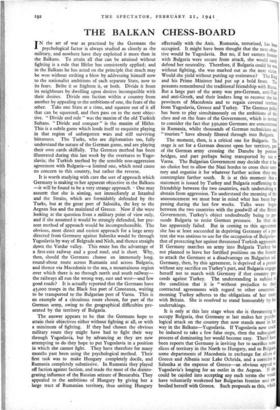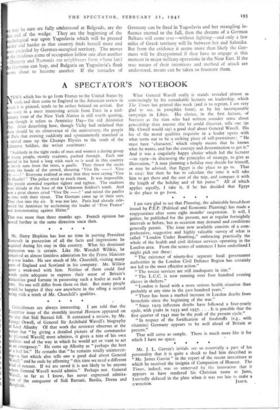THE BALKAN CHESS—BOARD
IN the art of war as practised by the Germans the I psychological factor is always studied as closely as the military, and nowhere have they exploited it more than in the Balkans. To attain all that can be attained without fighting is a rule that Hitler has consistently applied; and in the Balkans he has acted on the principle that much may be won without striking a blow by addressing himself now to the nationalist ambitions of each separate State, now to its fears. Bribe it or frighten it, or both. Divide it from its neighbours by dwelling upon desires incompatible with their desires. Divide one faction within a country from another by appealing to the ambitions of one, the fears of the other. Take one State at a time, and squeeze out of it all that can be squeezed, and then pass on to the next objec- tive. " Divide and rule " was the maxim of the old Turkish Sultans. " Divide and conquer " is the maxim of Hitler. This is a subtle game which lends itself to exquisite playing in that region of unforgotten wars and still surviving bitterness. The Turks, who are diplomatists too, fully understand the nature of the German game, and are playing their own cards skilfully. The German method has been illustrated during this last week by the overtures to Yugo- slavia; the Turkish method by the sensible non-aggression agreement with Bulgaria—a limited one, which need cause no concern to this country, but rather the reverse.
It is worth studying with care the sort of approach which Germany is making to her apparent objective in the Balkans —it will be found to be a very strange approach. One may assume that she is aiming, not immediately at Istanbul and the Straits, which are formidably defended by the Turks, but at the great port of Salonika, the key to the Aegean Sea and the mainland of Greece. Now if she were looking at the question from a military point of view only, and if she assumed it would be strongly defended, her pre- sent method of approach would be incomprehensible. The obvious, most direct and easiest approach for a large army directed from Germany against Salonika would be through Yugoslavia by way of Belgrade and Nish, and thence straight down the Vardar valley. This route has the advantage of a first-rate railway and a good road, and is short. Why, then, should the Germans choose an immensely long, round-about route across Rumania and across Bulgaria, and thence via Macedonia to the sea, a mountainous region over which there is no through north and south railway— the railways all run the wrong way, east and west—and few good roads? It is actually reported that the Germans have 45,000 troops in the Black Sea port of Constanza, waiting to be transported to the Bulgarian port of Varna. This is an example of a circuitous route chosen, for part of the German army, owing to the geographical difficulties pre- sented by the territory of Bulgaria.
The answer appears to be that the Germans hope to attain their objectives either without fighting at all, or with a minimum of fighting. If they had chosen the obvious military route they might have had to fight their way through Yugoslavia, but by advancing as they are now attempting to do they hope to put Yugoslavia in a position in which she cannot fight. They have therefore for many months past been using the psychological method. Their first task was to make Hungary completely docile, and Rumania completely submissive. In Rumania they played off faction against faction, and made the most of the disinte- grating influence of the Russian seizure of Bessarabia. They appealed to the ambitions of Hungary by giving her a large tract of Rumanian territory, thus uniting Hungary effectually with the Axis. Rumania, terrorised, has been occupied. It might have been thought that the next objee• tive would be Yugoslavia. But no, if her eastern frontier with Bulgaria were secure from attack, she would surely defend her neutrality. Therefore, if Bulgaria could be won without fighting, she was marked out as the next victim. Would she yield without putting up resistance? The King and his Prime Minister had put up a bold front. The peasants remembered the traditional friendship with Russia But a large part of the army was pro-German, anti-Turk and anti-Greek, and their leaders long to recover the lost provinces of Macedonia and to regain coveted territory from Yugoslavia, Greece and Turkey. The German policy has been to play simultaneously on the ambitions of this class and on the fears of the Government, which is invited to consider the fact that 350,000 Germans are concentrated in Rumania, whilst thousands of German technicians and " tourists " have already filtered through into Bulgaria.
The moment, then, is a critical one for Bulgaria. The stage is set for a German descent upon her territory, pan of the German army crossing the Danube by pontoon bridges, and part perhaps being transported by sea to Varna. The Bulgarian Government may decide that it has no choice but to allow the Nazi hordes to cross their tern. tory and organise it for whatever further action they may contemplate farther south. It is at this moment that a statement is issued by Turkey and Bulgaria reaffirming the friendship between the two countries, each undertaking to abstain from aggression. To understand the meaning of this announcement we must bear in mind what has been hap- pening during the last few weeks. Talks were begun between the two countries with the goodwill of the British Government, Turkey's object undoubtedly being to per- suade Bulgaria to resist German pressure. In that she has apparently failed. But in coming to this agreement she has at least succeeded in depriving Germany of a pre- text she was anxious to use for the occupation of Bulgaria– that of protecting her against threatened Turkish aggression. If Germany marches an army into Bulgaria Turkey has not planned to leave her fortified positions on the frontier to attack the Germans at a disadvantage on Bulgarian soil Germany, then, by this agreement, is deprived of a pretest without any sacrifice on Turkey's part, and Bulgaria engage herself not to march with Germany if that country pro- ceeds against Turkey. The understanding is subject to the condition that it is " without prejudice to their contracted agreements with regard to other countries, meaning Turkey adheres to the obligations of her treaty with Britain. She is resolved to stand honourably by her undertakings.
It is only at this late stage when she is threatening to occupy Bulgaria, that Germany at last makes her psycho- logical attack on the country that now stands most in her way in the Balkans—Yugoslavia. If Yugoslavia now could be induced to take a few false steps, then the subsequent process of dominating her would become easy. There have been reports that Germany is inviting her to sacrifice some slices of territory in the North to Hungary, and to Bulgaru some departments of Macedonia in exchange for ,slices of Greece and Albania near Lake Ochrida, and a corridor to Salonika at the expense of Greece—an obvious appeal to Yugoslavia's longing for an outlet in the Aegean. If she could be cajoled into accepting any such terms she would have voluntarily weakened her Bulgarian frontier and 01" broiled herself with Greece. Such proposals as this, which e may be sure are fully understood at Belgrade, are the a end of the wedge. They are the beginning of the chological war upon Yugoslavia which will be pressed der and harder as that country finds herself more and or:. encircled by German-occupied territory. The moves the insidious game of occupation follow one after another Hungary and Rumania are neighbours from whose land a Germans can leap, and Bulgaria on Yugoslavia's flank ems about to become another. If the tentacles of Germany can be fixed in Yugoslavia and her strangling in- fluence exerted to the full, then the dreams of a German Balkans will come true—without fighting—and only a few miles of Greek territory will lie between her and Salonika. But from the evidence it seems more than likely the Ger- mans will be disappointed if they have to engage at this moment in major military operations in the Near East. If the true nature of their intentions and method of attack are understood, means can be taken to frustrate them.































 Previous page
Previous page